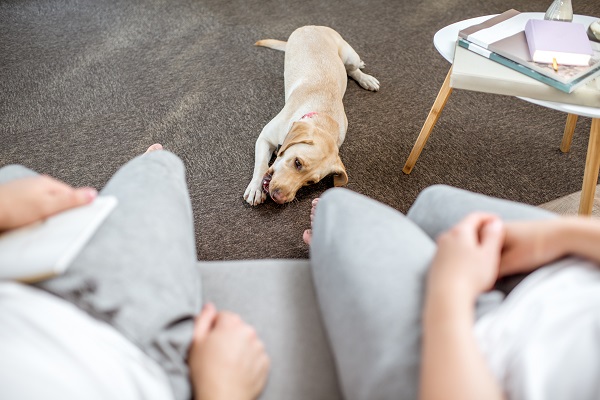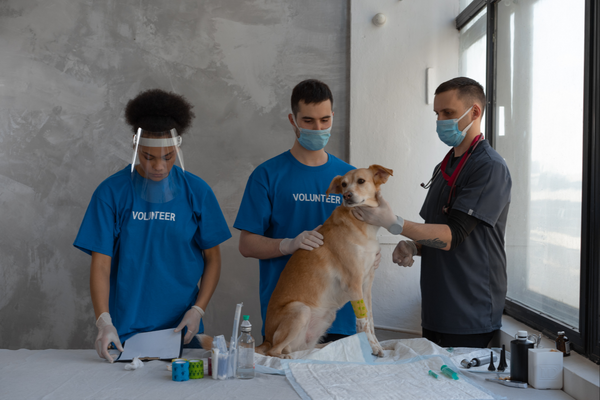Do you often notice your dog licking the floors and carpet? If it is a constant behavior you notice in your dogs, it may cause concern. Floor licking is typically a normal behavior for most dogs. But, Excessive licking of surfaces (ELS) is a sign of concern as there could be multiple reasons behind such abnormal behavior in dogs.
We will delve deeper into understanding the reasons behind your canine companion’s constant licking of floors and carpets. When dogs seek to explore the surrounding environment, they usually lick floors, tiles, carpets, couches, and other surface items. While this isn’t anything to be worried about unless your dog is licking the floors obsessively for long periods.
Reasons why your dog is constantly licking the floor and carpet:
Gastrointestinal tract disorder
Gastrointestinal disorders in dogs could be disorders like
- Inflammation of the pancreas
- Giardiasis
- Delayed gastric emptying
- Irritable bowel syndrome
- Gastric foreign body
- Eosinophilic infiltration of the GI tract
- Lymphoplasmacytic infiltration of the GI tract
If these gastrointestinal disorders are left untreated, it could lead to severe consequences. It is one of the reasons why your dog is constantly licking the floors and carpets.
Stress
Anxious dogs often give off negative signs. Licking surfaces is one of these signs. A dog licking any surface or carpet is a sign of stress and anxiety. The dog might start licking the carpet in response to a specific trigger. It could be either someone yelling or loud noise.
An anxious or stressed-out dog often moves their floppy ears back or lays flat if they have short ears. How dogs hold and move their ears indicates whether or not they are stressed or experiencing anxiety.
Nausea
Nausea or gastroesophageal reflux disease (GERD) plays a significant role in the excessive licking of surfaces. When dogs feel nauseous, they think the carpet is the best available at home and start impulsively licking it. Some of them will also lick other surfaces like floors and furniture. Nauseous dogs lick their front legs, drool, swallow frequently, and smack their lips.
Cognitive dysfunction
Canine cognitive dysfunction (CCD), known as dementia in dogs, leads to reduced awareness, alertness, and responsiveness. ELS is one of the symptoms of this condition. Licking becomes a stress reliever, releasing neurotransmitters to calm them. There is a drastic change related to brain aging.
If your dog is showing symptoms of cognitive dysfunction, talk to your vet to discuss the diagnostic tests, including blood tests, urine tests, MRI, CT, x-rays, and spinal fluid analysis.
Boredom
While licking is one outlet for a bored dog, so is chewing. Sometimes, dogs lick compulsively out of boredom. As soon as you suspect your dog is getting bored, ensure they get enough exercise and remains energetic.
Instead of watching your dog licking the carpet or the floor, get him out and play with them. Running and playing around will keep them happy and active all the time.
Pica and polyphagia
Dogs diagnosed with pica disorder eat smelly items like socks, undergarments, or towels. They also try to eat unusual and inedible objects like carpets and wood. Pica is a serious health condition and is treatable by any professional vet.
This non-specific behavior can occur due to numerous medical conditions. Polyphagia is a condition that happens due to diabetes or the use of other steroids. It affects the behavior of the dogs and leads to ELS.
Dental issue
Any dental conditions involving the teeth, mouth, or gums of dogs could lead to abnormal licking of surfaces. Dogs with dental issues or oral cavities show the following symptoms-
- Difficulty chewing
- Drool
- Stomach ulcer
- Oral tumor
Compulsive behavior
Often dogs try to ease away persistent stress and anxiety by performing repetitive behavior. It is called a compulsive disorder. It significantly interferes with the day-to-day activities of the dogs, thus causing them to behave unusually.
Dogs with compulsive behavior show symptoms like the excessive licking of surfaces, spinning, tail-chasing, constant pacing, mouthing, and self-trauma. This condition needs immediate attention and treatment.
Licking for taste and enjoyment
The most obvious reason for your dog to lick any surface is to test everything they find. If they find anything tasty by licking a surface, they keep licking the spot unless the taste is gone. However, if your dog keeps licking surfaces even after the flavor or taste is gone, they are likely not licking for taste but for other issues.
More than just the taste and flavor, many dogs lick surfaces because they enjoy licking the texture. Dogs enjoy licking different types of flooring, walls, furniture, and sometimes even trash cans.
For attention-seeking
When we shower our dogs with attention, we can reinforce behaviors allowing them to repeat things like licking surfaces or human body parts. The sign indicates that dogs are craving attention either because they are fond of it or because they lack it and crave that particular thing immensely and immediately.
These typical attention-seeking dogs do not care whether they are getting positive or negative attention. They are satisfied as long as it is attention for them.
Conclusion
Licking the floor and the carpets every once in a while is normal. However, if they continue this often, the behavior could indicate health issues. Experienced vets know how to examine dogs if they exhibit this licking behavior. To address the problem immediately, take them to your vet.
Dogexpress is one of the best pet blogs in India. Subscribe to the Dogexpress newsletter for a weekly dose of dog news and health tips.

 DogExpress
DogExpress


















 in Chandigarh, India.
in Chandigarh, India. 
